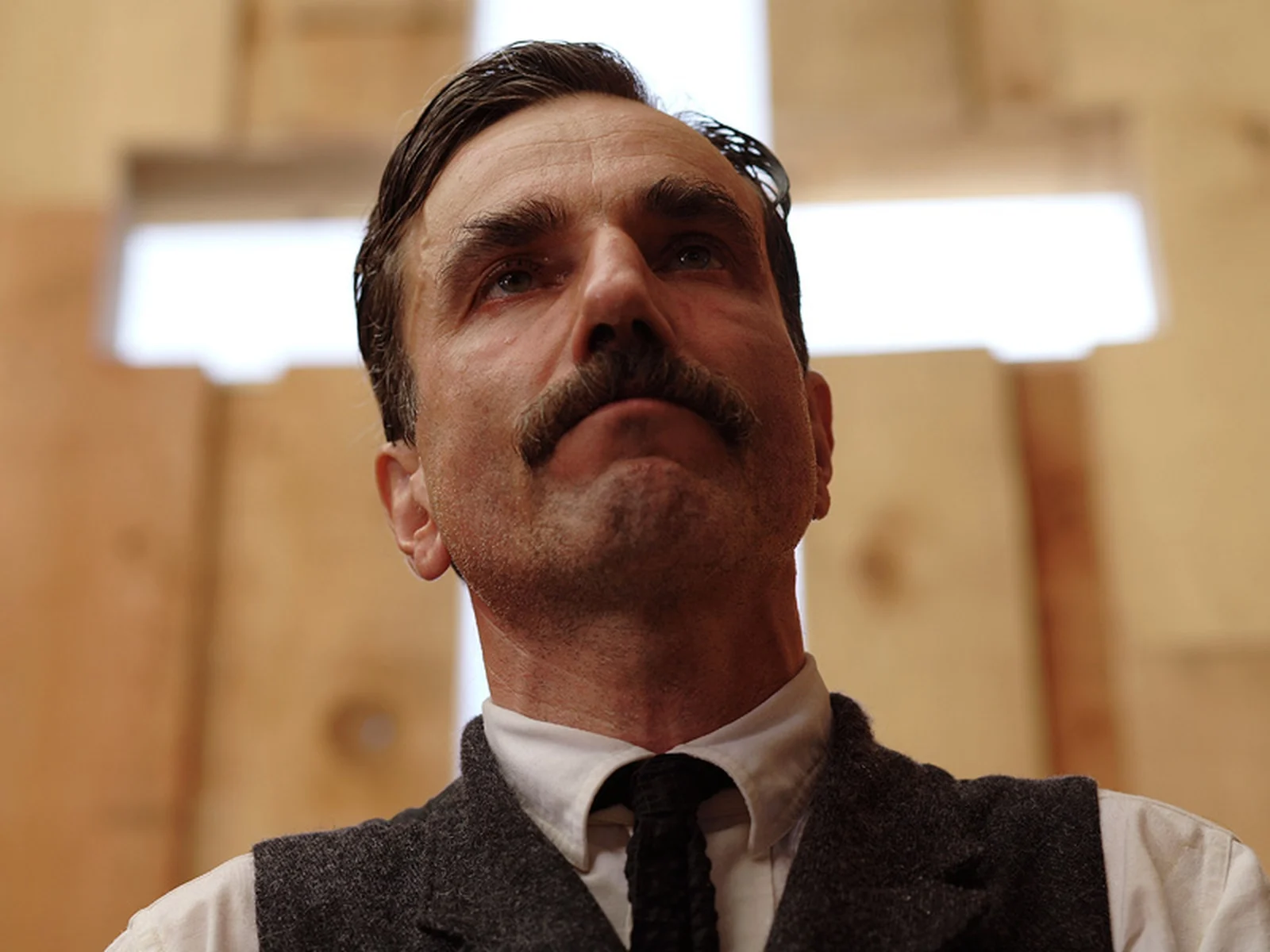Paul Thomas Anderson’s 2007 epic period tale, There Will Be Blood, is a grandiose pictorial drama chronicling the ascent of the formidable goliath, Daniel Plainview., who embarks on an ambitious quest cursed with perks & perils of becoming a business monopolist. Set against the period of burgeoning oil industry in the receding 19th & early 20th century, the film chronicles the Protagonist’s (Daniel Plainview’s) relentless pursuit — embellished with both boons and banes—and culminates in his transformation into an unassailable monopolistic force.
There Will Be Blood ascended to prominence as one of the greatest films of the 21st century, earning critical acclaim for its ambitious narrative, skillfully structured screenplay, and anxiety-inducing soundtrack. Its cinematography, grander than the largest canvas, alongside a virtuous production design and an Oscar-worthy performance by its lead actor, has been particularly extolled. Beyond its ostensible role as a period piece, There Will Be Blood (2007) resonates profoundly with contemporary business strategies and principles. The film is richly imbued with metaphorical allusions, encapsulating an array of human traits and ethical considerations as personified by its protagonist. It is a film that’s steeped in the metaphorical representation of human traits and tenets carried by its catalyst – The Protagonist.
As we witness the menacingly ambitious odyssey of Daniel Plainview, portrayed by the unparalleled Daniel Day-Lewis, we are inevitably drawn to the nonephemeral lessons embedded in his perilous walk in the pursuit of success. This pursuit is marked by a life fraught with danger: grease-stained torso and limbs, breathless efforts in the pits, the abhorring stench of greed, irreparably eroded spine, tartar-laden teeth, and the apparition of hard labor – all part of the grim existence of an oil man. Despite Plainview being a cold-hearted, bawdy misanthrope with a contemptuously nihilistic outlook – a character whose actions might deter one from admiration (cinematically speaking) – we cannot deny the rich derivation of survival theories and the excruciating sacrifices he makes to achieve the dream he envisioned. Starting with nothing but mud, ramshackle traction wheels, worn-out colleagues, and life as unstable as cryptocurrency, his journey is a testament to perseverance.
Although many of Plainview’s actions on his way to the top are subject to scrutiny and often deemed deplorable, he imparts an enduring life lesson: never forsake your past, never compromise in the present, and never cease envisioning your future. Suppose we conscientiously desire to look beyond the formidable façade of Daniel Plainview. In that case, we can discern a character as soft as a fluffy bunny yet masquerading as an ambitious fox brimming with self-conflicted actions. Nevertheless, the true essence of his heart is revealed in his decision to adopt an abandoned baby, who eventually becomes his competitor and source of disdain. Despite the ruthlessness exuded by the oil titan, Paul Thomas Anderson masterfully crafts Plainview’s character with such transparency and conspicuousness that the audience is compelled to peer through his rigid, pride-occulted exterior and into the depths of his heart.
Encapsulating Daniel Plainview in a single word is challenging, but one aspect stands out: he is a consummate businessman endowed with exceptional persuasive skills, having mastered the art of Aristotle’s Rhetorical Triangle. Daniel Plainview is a character shrouded in ambiguity, yet one thing is certain: he is a great businessman.
Elon Musk once remarked, “It’s ok to have fragile eggs in your basket as long as you control what happens to the basket.” This analogy aptly mirrors the life of Daniel Plainview if we consider his dreams as the ‘eggs’ and his life as the ‘basket.’ Plainview thrives in a polarizing environment, emanating a profound sense of narcissism perceived as a monopoly. In There Will Be Blood, he meticulously orchestrates every aspect of his life, thereby determining the outcomes of his actions. In essence, Plainview’s life challenges Newton’s third law: every reaction he faces is a deliberate consequence of his carefully crafted actions, epitomizing the idealistic, successful business entrepreneur.
Cinema is beyond what we see; it’s an altruistic medium, whether inadvertently or consciously, that strives to impart interdimensional life lessons when perceived in its purest form. Such is the beauty of cinema—a cathartic medium capable of steering life in the right direction.”
Moving forward with the aforementioned assertion, if interpreted rightly, ‘There Will Be Blood’ becomes a rich elixir of entrepreneurial wisdom, channeling these insights through the complex character of Daniel Plainview. His journey, marked by determination, strategy, and resilience, offers eight pivotal business lessons. These lessons can or might serve as invaluable for aspiring entrepreneurs seeking in the darkest pits for the blueprint for success – there isn’t any. However, this subtle interpretation of eight lessons might aid aspirants in designing their own blueprint. Feel welcome to partake in the process of exhuming invaluable business lessons from the misanthropic businessman, also one of the greatest partly-fictional protagonists to ever exist in cinema – forever indebted to Paul Thomas Anderson for creating a menacing miracle.
Author’s note: Please ensure you have watched the film before reading this article for a more personalized and contemplative experience
Show, Don’t tell!
Sounds familiar? It should if you are a screenwriter! However, non cinematically, this rule holds profound significance in a different realm: business. This lesson is vividly illustrated when an unassuming Paul Sunday (portrayed by Paul Dano) approaches Daniel Plainview with an oil business proposition. Plainview, astute and discerning, never lets his excitement cloud his judgment. He insists on substantiating the deal only upon the discovery of substantial oil, not mere seepage. This approach underscores a critical business tenet: in the world of business, “if” is synonymous with “no.” In an era where ideas and business tactics constantly evolve, the power to decisively say “no” is invaluable, often outweighing financial capital.
Plainview’s interactions, especially in contract negotiations, accentuate the significance of the word “if,” asserting his command over the terms. Given the complex nature of business etymology, it’s crucial to articulate your position with unequivocal clarity.
Bury Your Mistakes
Mistakes are vengeful ghosts! This lesson addresses the critical importance of managing mistakes in business. Allowing errors to escape unchecked is akin to letting them float freely in the open sky; assuredly, those mistakes will drop dead on us as haunting reminders in the future. It’s imperative in business to reassess each step and ensure no mistake gets away unsolved. Daniel Plainview’s method of addressing his mistakes is, admittedly, visceral and violent, especially considering the fate of Henry Plainview (his purported brother), who disastrously tangled with the wrong animal in the jungle. The severe consequence meted out to Henry by Plainview symbolizes the act of burying one’s mistakes instead of falling prey to them. This is not a literal suggestion but a metaphor for taking decisive action to rectify errors before they mutate into larger problems.
Get Rid of Impediments
Pain is merely an opinion, and in the abyss of business, opinions have no place—only facts and numbers hold significance. Daniel Plainview’s character embodies the challenging balance of being both reasonable and ruthless. His key traits include sharp discernment, acuity, heedfulness, and prudent behavior, all of which are essential qualities not just for a successful businessman but also for crafting a compelling protagonist in storytelling. Seldom does a business individual find himself in a pit where personal and professional lives intersect, demanding tough decisions and excruciating sacrifices.
A poignant example is when Plainview faces a tragic gas blowout accident that leaves his adopted son, H.W., deaf. This unfortunate event renders H.W.’s presence a hindrance to the business, compelling Plainview to make the heart-wrenching decision to part with his son, perceiving his existence in his crusade towards success as an impediment. This nifty scenario underscores that success is often an amalgam of the choices one makes and how one copes with the aftermath of those choices without falling prey to its dichotomy. Paul Thomas Anderson makes no mistake in showcasing those hideous facets of his protagonist conclusively to make the character more realistic, honest, sensible & grounded.
Be a Magician
There’s no magic; it’s the beguiling prowess of the magician, a master of illusion and misdirection, that does the trick and enchants the audience. “Magic is belief.” It’s an innate ability to cajole people into believing magic, which is, in reality, a nonexistent phenomenon. Daniel Plainview’s masterful sleight of hand in convincing others of his ambition exudes an enigmatic artistry within the business galaxy. He possesses an uncanny ability to discern precisely what to offer and, crucially, when to offer it to fulfill his self-objectives. In a key scene, he addresses the people of Little Boston, promising them manifold benefits like schools and improved agriculture for leasing their lands.
Here, Plainview’s focus is on what the community gains, artfully diverting attention from his own profiteering motives. Through this strategic display of benevolence, Daniel Plainview grants himself power as he adeptly plays the role of a benefactor. In business, as in magic, the true skill lies in steering perception and creating a narrative that captivates and convinces, all while the real motives remain concealed behind a veil of ostensible generosity. To suffice, Always be on the offering end in a business deal; it grants Power.
Show the World Your Good Side
Daniel Plainview is a man of many words and concealed stratagems. All hail the master auteur, Paul Thomas Anderson, who adeptly reveals his multifaceted protagonist to the audience in the film’s first act. By doing so, the narrative unveiling allows the audience to assume the role of an unseen intermediary, bridging the gap between the protagonist and the other characters. In doing so, the film creates a dynamic interaction where every decision made by Plainview incites a corresponding emotional ripple among the viewers. Only the veneer of his virtues is visible to those inhabiting his world, thus masking his ulterior motives.
His ability to project only his commendable side effectively manipulates perceptions, easing his navigation through the labyrinth of business and personal relationships. To the audience (as we are ostracized from his world and his business ambitions), Daniel is a colossal warmonger capable of crushing adversaries. To the people in his world who are correlated to his success, he plays a messiah. Reputation proceeds everything in business. A bad reputation in businesses begets share demolition, revenue plummeting, and the summoning of arch-nemesis. A good reputation guards the shore and keeps the bad reputation at bay. So, irrespective of who you are, be the “good” under the scrutiny of the business eye.
Act, Don’t React!

The frail dynamics between Mr Plainview and Pastor Eli, Paul Sunday’s twin brother, play a defining role in delineating the rise and fall of Daniel Plainview. The fierce religious conflict simmering between these two central characters, each representing capitalism and religion respectively, profoundly impacts the narrative – all hail Paul Thomas Anderson’s mastermind.
When a piece of land becomes a hindrance to laying pipes, Daniel Plainview yields to religious rituals, leading him to a humiliating public confession (I’ve abandoned my child) orchestrated by Eli. Despite possessing an aversion toward religion, Daniel Plainview is willing to go to any extreme to acquire what he desires. So, he acts, repressing the urge to react to achieve his goals. Impulsiveness and lack of suavity make a businessman a buffoon. Having self-constraint and the gumption to go to any measures to acquire what’s lucrative for the business is imperative. He strategically chooses to act rather than react, suppressing his immediate impulses in favor of long-term objectives. Sometimes, this implies that in business, it is advisable to act and oblige against your interests instead of reacting and facing the consequences.
Get Your Hands Dirty
“Great leaders are those who have endured significant ordeals and never hesitate to get their hands dirty.” The film introduces us to an exhausted yet optimistic protagonist, Daniel Plainview, laboriously excavating mud in a cavernous shaft in search of silver. Despite his frail and beaten appearance, he demonstrates incorrigible persistence, iterating his efforts multiple times. Fundamentally, ‘getting your hands dirty’ transcends the literal act of engaging in physical labor. It speaks to an individual’s mindset and motivation, fostering an incorrigible mental state.
Throughout the film, Daniel Plainview rarely depends on his crew and labor; instead, his adept, dexterous skills are showcased, keeping him afloat amidst challenges. He consistently eschews luxury while building his empire, embodying the ethos that great business people stop for no reason. A businessman should never succumb to luxury or delegation; he/she shall arrive at the occasion to achieve what he/she wants. To succeed as a businessperson, you shall succeed as a person who can get the job done even when the world refuses to help you.
Never Break Character
“Never Break Character” – and this isn’t just a pun on Daniel Day-Lewis’s infamous method of acting. While discussing Day-Lewis’s approach to his roles, particularly during the promotion of the film Phantom Thread on Jimmy Kimmel, Paul Thomas Anderson famously remarked, “You don’t go to work with Daniel Day-Lewis; you go to work with whoever his character is.”
Learning the ability to maintain unwavering character integrity is a cornerstone of success, especially when aiming to excel in any specific field. Having “character” acts as a bridge, harmonizing external realities with inner zeal in a pristine state. Regardless of the circumstances, it’s imperative to never break character and not succumb to external pressures or consequences. You’re not Logan Roy, and this is “Succession.” In the real world, if you want to be touted as the most successful businessman, live like it. Stay in character and never and never let anything break you.
With all that has been said and done, the celebratory oeuvre of Paul Thomas Anderson represents a confluence of writing, passion, and filmmaking prowess that is contagiously inspiring to budding filmmakers and aspirants worldwide.
As Christopher Nolan eloquently stated, ‘The audience’s desire to be surprised, to see something new, to experience what they did not know they wanted, that’s always been the most powerful force in film.’ In this light, There Will Be Blood, directed by one of this century’s most influential filmmakers, Paul Thomas Anderson, stands as a cinematic marvel. Its profound gravitas is rooted in its astonishing writing and the immersive experience brought to life through Daniel Day-Lewis’s captivating raconteurship. I staunchly believe that this film continues to captivate audiences, rekindling their love for cinema with a newfound depth and reverence for its artistry.
Over the decades, cinema has earned an indisputable reputation for its ability to shape human behavior and character, thanks to its shrewd writing and purpose-driven art. There Will Be Blood (2007) transcends mere visual storytelling; it will forever be revered as quintessential cinema that imparted a profound lesson: ‘When life gives you a milkshake, make sure you have the longest straw.’








